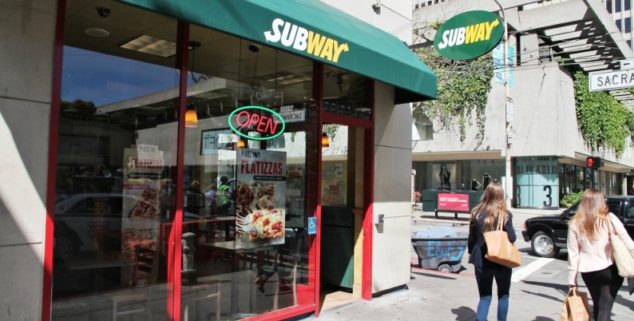Opinion
Franchises are key to a healthy California workforce
 A Subway outlet in San Francisco, one of an estimated 40,000 Subway eateries worldwide. (Photo: Tupungato, via shutterstock)
A Subway outlet in San Francisco, one of an estimated 40,000 Subway eateries worldwide. (Photo: Tupungato, via shutterstock)California has always been a place where aspiring entrepreneurs can go to harness their full potential and explore new opportunities. For me, that exploration began in 1995 in San Francisco when a former classmate of mine was starting a new concept in quick service restaurants: World Wrapps.
I made a small investment but took a big interest in the restaurant industry. Over the next four years, I helped open new stores in the Pacific Northwest and learned every job along the way. From construction and front-of-house service to serving food and busing tables – I got a crash course in opening and operating restaurants.
But then a new opportunity arose just a few years later when I learned that there was financing available to enter the franchise sector – where customers already know you, employees know you and want to work for you, and your established brand makes it easier for landlords to see your value as a tenant.
AB 257 would effectively kill the franchise business model in the state – putting at risk the more than 75,000 local businesses and 728,000 jobs in our franchise sector.
It was 1999 and casual dining was booming, so my partners and I obtained financing and purchased eight Applebee’s restaurants. We transformed those businesses and grew revenue by more than 30 percent – enabling us to continue purchasing new locations and establishing the Flynn Restaurant Group as it is known today.
The franchise system that helped me and my company grow, and so many others like me, must be protected and preserved so that it can provide new opportunities to the next generation of local franchise owners.
Here in California, the state Legislature is considering AB 257, also known as the FAST Act. It would effectively kill the franchise business model in the state – putting at risk the more than 75,000 local businesses and 728,000 jobs in our franchise sector.
Local franchise businesses are as diverse as California. Just one quarter of franchises are quick service restaurants – the other 75 percent ranges from childcare and personal services to fitness and home painting. Franchising offers employees a quicker path to management, 2.2% to 3.4% higher wages, and better benefits than their non-franchise counterparts. Furthermore, franchising encourages higher rates of entrepreneurship among women, people of color, and other underrepresented communities.
Franchising provides opportunities to people like Danielle Rocha. Danielle started with Panera as a part-time hourly associate in 2012 in one of our Sacramento area locations. Over the course of five years, Danielle grew from a part-time employee to General Manager of our Fairfield location due to her tireless work ethic and desire to learn and grow at every opportunity. Today, she has relocated to our Chico location and purchased her first home with her fiancé. It’s been truly incredible to watch her growth and success over the past 10 years and see her persevere from an extremely challenging upbringing.
As a franchisee, our people are the most important asset, and we make every commitment to help others achieve their goals. We simply provide the tools, support and experience as a runway for professional growth. From there, the sky is the limit for all our employees.
These stories are the reason the franchise business model must be preserved. Not only do they provide jobs and career paths, but locally owned franchises are also active members of their communities.
Whether it is by sponsoring local sports programs or donating to school fundraisers, these business owners and employees contribute to something bigger than themselves. And it is why so many people are drawn to franchising – local ownership of a business, with an established playbook, is incredibly meaningful and rewarding to the entire community.
Last week, the International Franchise Association is rolled into Sacramento on its Open for Opportunity Roadshow, partnering with local organizations like the Greater Sacramento Economic Council, California Black Chamber of Commerce, California Chamber of Commerce, among others.
The conversations focused on how franchising can break down barriers to business ownership and how it embodies work ethic and dedication to the community. I hope that Californians who want to become their own boss can find their own opportunity in franchising.
—
Editor’s Note: Greg Flynn is the founder, chairman and CEO of the Flynn Restaurant Group, with approximately 2,400 Applebee’s, Taco Bells, Paneras, Arby’s, Pizza Huts and Wendy’s restaurants generating $4 billion in sales.
Want to see more stories like this? Sign up for The Roundup, the free daily newsletter about California politics from the editors of Capitol Weekly. Stay up to date on the news you need to know.
Sign up below, then look for a confirmation email in your inbox.

Leave a Reply